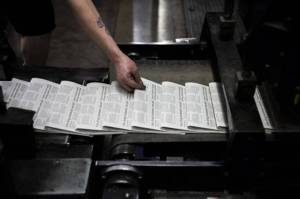Cruising, in regular order
Published 11:50 am Wednesday, April 14, 2010
WASHINGTON — When Obama administration officials discuss their foreign-policy approach, they often use the term “regular order.” It sounds like a military expression, but it actually refers to the normal rules of the House and Senate, where so many of them worked before.
A top aide explains what would happen if a senior official just tried to walk into the Oval Office and brief the president on a pet policy initiative. President Obama would send the petitioner away, telling him that his pitch hadn’t been reviewed by the staff and was “not regular order,” explains the aide.
Regular order means “proper procedure” for this group, in other words. It’s a mundane but characteristically Obamian vision of how government is supposed to work: orderly, systematic, no surprises.
White House officials think they are finally hitting this bureaucratic cruising speed, well into the second year of Obama’s presidency. They have created a system that is framing and launching national security initiatives — pop, pop, pop — across a range of global topics.
That confident process was on display here this week, at a 47-nation summit on nuclear terrorism — one of the issues that have worked their way up the Obama policy chain. It was regular order on steroids, with limousines racing around town carrying policymakers to multilateral conferences and bilateral meetings with the president — all with sirens blaring and cops shooing ordinary mortals away.
Honk, honk! If it was Monday, it must be President Viktor Yanukovych agreeing to accept Obama’s proposal to safeguard Ukraine’s highly enriched uranium. Or maybe it was Chinese President Hu Jintao discussing with Obama new sanctions against Iran.
Behind all the commotion, a big strategic initiative has been rumbling down the policy pike: The idea is to move away from the old paradigm about nuclear danger — the image of warheads atop missiles — to the new threat of nuclear terrorism. Even with rogue states such as Iran and North Korea, most strategists view the big danger as a leak of fissile material into terrorist hands, not the old version of nuclear Armageddon.
This change in nuclear strategy has been urged in a blizzard of bipartisan policy papers over the last few years, but it takes a disciplined National Security Council process to make the change happen. That’s where Obama and regular order come in:
In a two-week rush, he has signed the New START treaty with Russia, cutting warheads by 30 percent and rehabilitating the arms-control process; he has boosted the rewards for signing the non-proliferation treaty by issuing a new “nuclear posture” statement promising no nuclear attacks on countries that adhere to the NPT; and now this week’s summit on nuclear terrorism.
A lot of moving parts, but there has been a method to the manic schedule.
You could make a similar argument that Obama has been going through his foreign-policy checklist since taking office, to adjust policies that he thinks were badly out of date: improve U.S. image in the world, check; “reset” relations with Russia by dropping an ill-considered plan for missile defense, check; improve relations with Pakistan so the U.S. has a viable exit strategy from Afghanistan, check; encourage India-Pakistan dialogue, check; try to engage Iran so that we’ll be credible in requesting tough sanctions later, check; create an American peace plan for the Middle East, half-check but still working on it.
All these policies have moved through a well-managed NSC. There’s the “adult” group of Secretary of State Hillary Clinton, Defense Secretary Bob Gates and national security adviser Jim Jones; they see eye to eye on most issues. Beneath them are the policy processors, led by Tom Donilon, the deputy national security adviser, and his de-facto boss, Rahm Emanuel, the chief of staff.
As he imposes regular order, Obama is trying to fix what he saw as President George W. Bush’s disorderly process. During Bush’s second term, he personalized policy, making secure videoconference calls with leaders in Kabul or in Baghdad, without always making sure the nuts and bolts were fastened. Bush’s first-term NSC was pure chaos, with Defense Secretary Don Rumsfeld refusing to play in the interagency process, and Vice President Dick Cheney running what amounted to a parallel NSC staff. No wonder foreign policy got so messy.
Obama’s danger is that he tries to do too much: He’s an ambitious if also tidy man, who never saw an initiative he didn’t like. But at least he has evolved a coherent, well-run NSC structure to keep most of — if not all — the balls in the air.
David Ignatius is a Washington Post columnist. His e-mail address is davidignatius@washpost.com.


